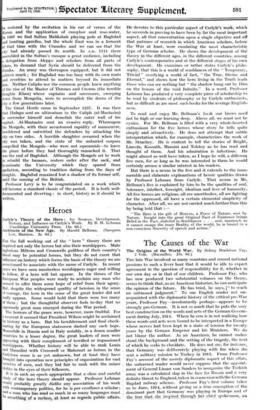Heroes
Carlyle's Theory . of the Hero : Its Sources, Development, History, and Influence on Cirlyk's Work. By B. H. Lehman
(Cambridge University Press. • l Is. C*L ) - Architects of the New Age. By Harold Bellman. (Sampson Low, Marston. 3s. 6d.) • , Fon the full working out of the " hero " theory there are
required not only the heroes but also their worshippers-. Mute inglorious Miltons• and Cromwells guiltless of their country's blood may be potential heroes, but they do not exert that influence on history which forms the basis of the theory we are accustomed to associate with the name of Carlyle. In recent
years we have seen numberless worshippers eager and willing
to follow, if a hero will but appear. In the throes of the European War peoples were ready to acclaim any man who
seemed to offer them some hope of relief from their agony.
But, despite the widespread quality of heroism in the sense of courage, the hero in the sense of the great leader did not really appear. Some would hold that there were too many of them ; but the thoughtful observer feels to-day that no supremely great man emerged during the War period.
The horrors of the peace were, however, more fruitful. For '
a moment it seemed that President Wilson might be acclaimed by history as a hero. But his bewilderment and final cheek- mating by the European statesmen dashed any such hope. Meanwhile in Russia and in Italy notably, in a dozen smaller countries to a lesser degree, the great leaders of men were aPpearing with their complement of terrified or impassioned worshippers. Whether history will be able to rank Lenin and Mussolini with Cromwell or Mahomet as heroes in the .
CarlYlean sense is as yet unknotyn, but at least they have , brought into- operation new principles of organization for vast societies of men, and they bid fair to rank with the minor . deities in the eyes of their followers.
It is in such an epoch appropriate that a close and careful study of the hero theory should appear. Professor Lehman
would probably greatly dislike any association of his work
with contemporary polities, for he is par excellence a scholar ; and a man who has read so much in so many languages must be °wad/sing of a rtsjuse., at least as -regards public- affairs. He--dei,otes to thig pattfetila-rraiiket-of Carlyle's work; which be succeeds in proving to have been by far the most important aspect, all that concentration upon a single objective and all' that patience of research in which American scholars, before the War at least, were emulating the most characteristic type of German scholar. He shows the development of the theory in the different ages, in the different countries, among Carlyle's contemporaries and at the different stages of his own development. He examines or rather states Carlyle's philo-. sophy, that this is a world of semblances of the " Temporary,
Trivial " overlying a world of fact, " the True, Divine and Eternal," and shows how the hero living in the Truth leads those who can see nothing but " the shadow hung out by Him,
on the bosom of the void Infinite." In a word, Professor.
Lehman has produhed a very complete piece of scholarship to be read by students of philosophy or by Carlyle enthusiasts, but as difficult as are most such books for the average English. man.
To read and enjoy Mr. Bellman's boak our brows need not be high or our learning deep. Above all, we must not be cynics. For Mr. Bellman is filled with a very whole-hearted enthusiasm for the five heroes whose story he tells quit simply and attractively. He does not attempt that subtle
interpretation which, for example, characterizes the work of
Mr. Strachey. He is content to tell the stories of Bright,. Lincoln, Kossuth, Mazzini and Tolstoy as he has read and thought of them. And his admiration is infectious. He might almost as well have taken, as I hope he will, a different five men, for so long as he was interested in them he would
certainly arouse a similar interest in his readers.
But there is a nexus in the five and it extends to the innu.
merable and elaborate explanations of heroic qualities drawn
by Professor Lehman from Carlyle. That nexus in Mr. Bellman's five is explained by him to be the qualities of zeal; tolerance, intellect, foresight, idealism and love of humanity.; All five heroes are religious, all are unorthodox, all are fighting for the oppressed, all have a certain elemental simplicity of
character. After all, we are not carried much further than this by being told that _
" The Hero is the gift of Heaven, a Force of Nature, sent by Nature. Insight into the great Oiiginal Fact of Existence brings. Belief in the Fact, disbelief in Semblances . . . and, inasmuch as it cannot escape the inner Reality of the world, he is bound to a non-conscious Sincerity of speech and action."


















































 Previous page
Previous page